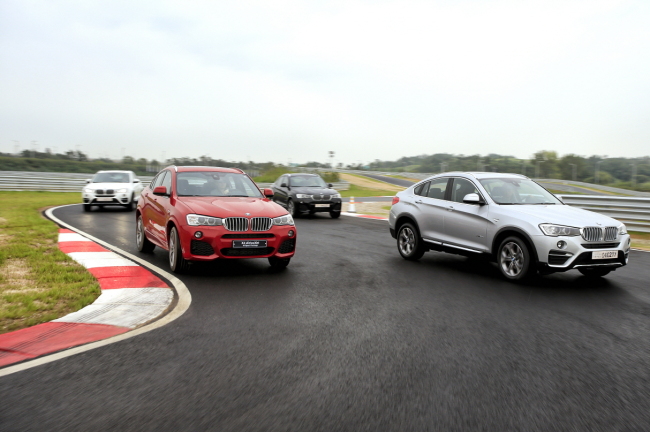BMW is known for its bottomless appetite for new models, and the BMW X4 is another segment-splitting X Series sport utility vehicle from the luxury carmaker.
Journalists scratched their heads a few years ago when BMW unveiled the X6, a mid-size crossover with coupe-like styling. But the car defied skepticism to find some 250,000 buyers around the world.
The new X4 carries the same concept ― “sport activity vehicle” ― but in a smaller, more fashionable package.
 |
| [Behind the Wheel / BMW X4] Design: ★★★★☆ / Interior: ★★★☆☆ / Engine: ★★★☆☆ / Cost and A/S: ★★★☆☆ BMW X4 cars are test-driven on the racetrack of BMW’s new driving center in Yeongjongdo Island, Incheon, Aug. 18. (BMW Korea) |
The X4 shares a platform with the more practical X3, but is about half an inch longer and 1.5 inches lower overall. The lower center of gravity allows for an excellent driving position similar to a sports sedan.
A long hood and a slanting roof line gives the X4 a dynamic appearance, although this fastback styling has yet to be widely appreciated in Korea, where hatchbacks and wagons are not big-sellers.
Last week, BMW Korea invited journalists to its new driving center on Yeongjongdo Island, Incheon, to test-drive the new car on a 2.6-kilometer racetrack.
The BMW complex, consisting of a racetrack, a car gallery and other refreshment facilities for adults and children, is the first of its kind in Asia and the third globally, following those in Germany and the U.S.
Of the two diesel models launched here ― the X4 xDrive20d xLine and the X4 xDrive30d M Sport Package ― I was offered the sportier xDrive30d, which generates 258 horsepower and a maximum torque of 57.1 kilogram meters.
According to the carmaker, the car can accelerate from zero to 100 kilometers per hour within 5.8 seconds. An eight-speed automatic transmission with manual paddles and all-wheel-drive system is standard for both models.
Due to the drizzle, I had some concerns about bringing the car onto the wet racetrack.
But the car hurtled down the straights and exploded out of every tricky corner. The firmly weighted steering, which was quite responsive, made driving easier than most SUVs and handled corners like a compact.
Knocking the gears into sport made the accelerator pedal more responsive. Its overall road behavior benefited from torque-vectoring, a feature that apportions thrust across and between axles to maximize grip.
The supportive front seat and the thick-rimmed, leather-bound steering wheel ― both more often found in sports cars ― also made the drive more fun.
My only annoyance was with the slanting rear window that restricted backward visibility. This window also reduces headroom in the back seat. But again the X4 is built for style rather than utility.
For buyers, it is always better to have more vehicles to choose from, and BMW has a knack for meeting both mass and niche demands.
A driver who wants a car that drives like a BMW 3 Series with more cargo volume would be better off with a 3 Series wagon, while those who want a better view of the road can consider the X3 SUV.
For people who want the driving experience of a sport wagon with the seating position of an SUV, the X4 is a good fit. It seems like a BMW’s key competitor is always another BMW.
BMW Korea has not yet announced the official fuel economy ratings of the X4. The prices start from 70 million won ($69,000) for the xLine and 86.9 million won for the sport package.
By Lee Ji-yoon (jylee@heraldcorp.com)



